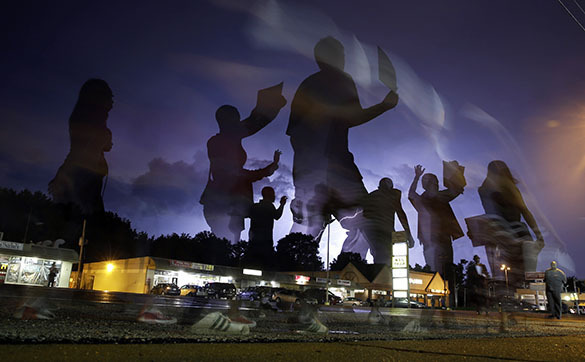Black anger and white frustration
By Peter Baofu, Ph.D.

The shootings to death of 3 blacks in 3 separate incidents involving white police officers in America in recent months - and the killings of 3 police officers by black attackers in 2 separate incidents (in New York and Florida) afterwards (in apparent retaliation) reveal an uncomfortable truth which is not discussed in the American mainstream media. And this uncomfortable truth is that the American credo of "All men are created equal" is ideologically false, as it is not a "self-evident truth" at all but propounds a form of what I call "heterophobia," that is, the fear of recognizing the biological differences on the basis of race (and, for that matter, of gender, ethnicity, and the like).
As long as America refuses to confront this uncomfortable truth, the racial tension between whites and blacks will continue for decades to come, regardless of what the outcomes of the pending civil and criminal cases about the incidents will turn out to be. In the end, what is at stake here concerns the future of democracy in America and the world at large.
(1) TWO FALSE ASSUMPTIONS IN THE AMERICAN CREDO
The American credo in the U.S. Declaration of Independence of the Thirteen Colonies, that is, "We hold...[this] truth...to be self-evident, that all men are created equal," is based on 2 false assumptions which the Founding Fathers dogmatically made at the time (in the 18th century).
The first false assumption is that all men are "created," because the Founding Fathers believed in Creation Theory. As I already explained in THE FUTURE OF CAPITALISM AND DEMOCRACY (2002), the credo of "All men are created equal" as used by Thomas Jefferson fits well in his religious worldview with the Unitarian movement of the time, "in recognizing Jesus as a moral teacher and a religious reformer,...As he himself once said, '[t]here is not a young man now living in the U.S. who will not die a Unitarian.' And so much religious was his life outlook that he spent the pastime in his older days to collect passages from different Christian texts into a collection now published as THE JEFFERSON BIBLE....Mark Noll, an evangelical historian at Wheaton College in Illinois, noted that Jefferson 'studied Scripture every day during the last 50 years of his life.'"
The problem here is that the Creationists accept Creation Theory as a matter of religious faith, but both the atheists and the critics regard Creation Theory as a product of outdated superstition. The debate between Creation Theory and Evolutionary Theory, for example, has continued unto this day.
And the second false assumption is that all men are "equal" on the basis of "natural law" in the Social Contract tradition, which was popular at the time of the Founding Fathers, who admired the writings on social contract by John Locke, John S. Mill, and others, for instance.
The problem here is that the Founding Fathers invoked the myth of equality in the Social Contract tradition "only in order to justify independence for the colonists in light of their being maltreated by the British Crown, but not to abolish slavery, since the very idea of equality was not intended to apply to non-whites (especially blacks)." (P. Baofu 2002) After all, Jefferson, like many of the Founding Fathers, were themselves slave owners. And more importantly, the very idea of "natural law" in social contract theories is essentially problematic, because it ultimately derives from "divine law," as natural laws are "ordinances" expressing "God's will," according to Locke.
Not only the atheists reject "divine law" as superstitious, but also the critics have since offered different alternative (often competing and conflicting) approaches to political thought, and they are as diverse as Marxism, Nietzscheanism, third-world nationalism, orientalism, neo-Confucianism, post-modernism, and many others. And the contemporary debate on "the clash of civilizations" constitutes a latest chapter of this recurrent schism in the modern history of political thought.
(2) BLACK ANGER, AND THE OBSESSION WITH SOCIO-CULTURAL EXCUSES
Yet, in historical retrospect, the American credo has given great solace to the Civil Rights Movement, in spite of its false assumptions, and no one has elevated "this dogmatic thought to its utmost metaphysical height higher than Martin Luther King himself, who said in one of his most well-known speeches: 'If we are wrong [in regard to this self-evident truth], then the Almighty God is wrong.'" (P. Baofu 2002) But the uncomfortable truth here is that "the Almighty God is wrong," very wrong indeed.
Since then, many blacks have followed King's dogmatic faith and have developed the indulgent habit of mind to blame their multifaceted problems in America on racial prejudice and discrimination by white folks. Surely, there is racism by whites against minorities in America, but "blaming" is a double-edged sword, as it also blinds oneself from seeing the other side of the same mirror, since it ends up distracting one's attention from the real issues, for 3 reasons (to be explained below).
The first reason is that many blacks try to use racial politics to interfere into the judiciary due process, which constitutes a serious violation of "judiciary independence" long cherished in the American legal system (under the "separation of powers" doctrine), as the grand juries in all three cases had already carefully examined the evidences presented and rejected the public allegations (mostly by black folks) against the white police officers in the 3 incidents as unfounded. There is a grave danger of "wrongful persecution" in racial politics here. If this political interference were to occur in Russia, China, or Venezuela, it would immediately be condemned as "wrongful persecution" (as a form of "judiciary corruption").
By contrast, when O. J. Simpson, a black, murdered 2 whites some years ago and the predominantly black jury acquitted him, many white folks were intensely shocked about the verdict but respected the judiciary due process anyway, with the understanding that "an individual is assumed to be innocent until proven guilty" in the American legal system, which was set up with the purpose to minimize the possibility of convicting innocent individuals (that is, to promote the freedom from "wrongful persecution").
In the current crisis, many blacks already assume the white police officers to be "guilty" even before they are proven to be so in court and assume them to be "guilty" again even after the grand juries had carefully reviewed the evidences and dismissed the cases. Of course, the American legal system is not perfect (because it does not absolutely guarantee that a guilty individual will not be found innocent instead, as shown in the case concerning the acquittal of O. J. Simpson for the murder of 2 white folks some years ago). But the American legal system values the freedom from "wrongful persecution" enough that it is willing to accept the risk of setting a guilty individual free.
In light of this spirit, what many black protesters are doing in the current crisis is as much "anti-democratic" as "un-American," because they are advocating what many "authoritarian" regimes have been accused of doing, namely, to assume "an individual to be guilty until proven innocent" even before the completion of any judiciary due process and to still insist the three police officers to be "guilty" again, even after the grand juries examined the evidences and rejected the public allegations (mostly by black folks) against the white police officers as unfounded.
In addition, the mindset of many black protesters is quite "racist," as a form of what I called in my previous publications "reverse-racism," as they demonize white police officers as necessarily "bad," "brutal," "prejudiced," "violent," etc. and glorifying black suspects as necessarily "good," "heroic," "law-abiding," "do-nothing-wrong," "innocent," "victimized," etc. I already addressed in detail this new phenomenon of "reverse-racism" (as part of "reverse discrimination") in BEYOND DEMOCRACY TO POST-DEMOCRACY (2004) and THE FUTURE OF CAPITALISM AND DEMOCRACY (2002).
In the end, the grave danger of "wrongful persecution" under the intense pressure of racial politics by black protesters cannot be ignored, because America is no stranger to innocent victims of this type in its tumultuous past, and two good examples are the "red hunt" for "Communists" during the notorious period of McCarthyism in the 1950s and the "witch hunt" in the older days (like the infamous "Salem witch trials"). And now, the grave danger here is the "hunt" for "racist white police officers" under the banner of the Civil Rights Movement by black protesters, who are building up the political pressure on the U.S. Department of Justice (under the leadership of a black Attorney General) to intentionally force through some legal cases against the white officers in question (together with some civil cases being filed in civil courts), even after the grand juries had already carefully examined the evidences and found them not credible. America is dangerously entering a potentially dark period of the "police hunt," just as there were the "red hunt" in the 1950s and the "witch hunt" in the older days.
The second reason is that many blacks in America can empower themselves in an alternative (but more effective) way by learning something from Asian Americans, who are often regarded as the "model minority" in the United States. Blacks are not the only group suffering from racist prejudice and discrimination by whites in America. Many Asian Americans, after all, are often maltreated, as reflected in the all so common humiliating slang like "fucking gooks" often directed against them, not just by whites but also by blacks themselves. Yet, many Asian Americans have been able to climb up the social ladder of success in business and in education, for instance, in spite of all their often untold sufferings.
In fact, Asian Americans are known as "super-achievers," as many Asians enviably have higher scores than whites in different tests (e.g., SAT, ACT, GRE, etc.), often graduate at the top of their classes, have won time and again science and math competitions, and excel in setting up new businesses, among other things. In America, if you go to university libraries, you will likely see Asian students studying hard until late hours, but you will hardly see many black American students doing the same. However, if you go to the gyms, you will likely see plenty of black folks playing basketball, doing weight-lifting, or something else physical. Or if you happen to pass by red districts (and dark alleys) in late hours, you will likely see black folks (especially black men) hanging around for dubious activities. Surely, there are exceptions in all of these cases (to be explained by circumstantial reasons), but exceptions are not the rule.
And the third reason is that the "black" problem is not solely socio-cultural in America (as many black folks are quick to blame white racism with those handy excuses) but is universal in black communities around the world, be they in the Caribbean islands, sub-Saharan black Africa, or Latin America. In many of these black communities, one often sees poverty and underdevelopment, and the symptoms are numerous enough (e.g., riots, civil wars, genocides, corruption, epidemics, famines, coups, brutality, crimes, etc.). Of course, these symptoms vary from one country to another (with some countries having more and others having less or nothing at all) -- and there are also improvements over time, but the gap between black communities and the rest of the world persists.
For instance, in Zimbabwe (in southern Africa), the government under Robert Mugabe began the forceful redistribution of farmland owned by whites (in his "anti-colonial," "anti-white" drive), and yet the country has fallen deeper and deeper into poverty after all these decades. In Haiti (in the Caribbean islands), the country has remained poor and underdeveloped after more than 200 years of independence from its former colonial master, France. And in spite of hundreds of billions of dollars from the United Nations and other aid donors given to black communities in all these decades, they remain poor and underdeveloped, when contrasted with other regions in the world. In fact, the current Ebola epidemic in Western Africa (again, with generous aids from the United Nations and donors like China, the U.S., and the E.U.) is a latest chapter of this chronic helplessness in black communities around the world.
By contrast, in both Hong Kong and Singapore, which were former British colonies, the predominantly ethnic Chinese folks there, in spite of the lack of natural resources, have been able to develop themselves to the point that their current levels of income per capita are much higher than what the British in the U.K. are enjoying, because the ethnic Chinese did not play the game of blaming the "white" folks for their own problems and instead had worked very hard and used their talents to better themselves in the last few decades.
So, how much longer can many black folks continue to blame their multifaceted problems on whites (like the "racist" white police officers in the current example) in America? Blaming others for one's problems is so easy to do, but solving one's problems once and for all is so much harder.
Proceed to Part II of the article
Peter Baofu
_____________________
Dr. Peter Baofu is the author of 77 books and 79 new theories, all of which provide a visionary challenge to conventional wisdom in the social sciences, the formal sciences, the natural sciences, and the humanities, with the aim for a "unified theory of everything" -- together with numerous visions of the mind, nature, society, and culture in future history. For more info about his visions on the future of global affairs, see some of his 77 books, such as "The Future of Post-Human War and Peace" (2010), "Beyond the World of Titans, and the Remaking of World Order" (2007), "The Future of Post-Human Sports" (2013), "Beyond Nature and Nurture" (2006), "Beyond Civilization to Post-Civilization" (2006), "Beyond Capitalism to Post-Capitalism" (2005), "Beyond Democracy to Post-Democracy" (2004), "The Future of Capitalism and Democracy" (2002), the 2 volumes of "The Future of Human Civilization" (2000), and so on.
Subscribe to Pravda.Ru Telegram channel, Facebook, RSS!





